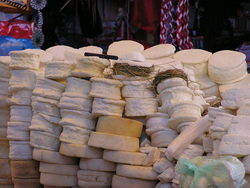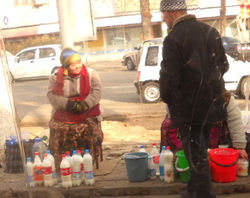The great milk robbery

Cheese at a market in Ayacucho, Peru (Photo: Tomandbecky).
The great milk robbery
A new report by GRAIN documents the importance of milk to the livelihoods and health of the poor in many countries of the global South. Most dairy markets are supplied by small-scale vendors who collect milk from small farmers and pastoralists. But they are under threat from dairy corporations, like Nestlé, and other players, like PepsiCo and Cargill, that are trying to take over the dairy sectors in these countries, from the farms to the markets.
"People's milk" involves hundreds of millions of people around the world, from small-scale farmers and pastoralists to local cheesemakers and fresh milk vendors. They supply safe, nutritious and affordable milk to hundreds of millions of poor families.
- 80% of the dairy markets in developing countries are supplied by these "people's milk" systems, often referred to as the "informal sector"
- 15% of the global population is involved in dairy production
- Small-scale dairy systems in the South create 200 rural jobs per million litres of milk/year compared to 5 rural jobs per million litres of milk/year in the industrial milk production systems of the North
- In Pakistan, Kenya and Colombia, fresh people's milk sells for half the price of packaged milk in the supermarket.
Small-scale farmers, pastoralists and vendors are doing an amazing job of supplying the growing markets for dairy in the South. The problem is that corporate interests are after these same markets and they are using heavy tactics to steal them from the poor, while governments are lending a helping hand.
- Bilateral trade agreements allow transnational dairy corporations to periodically dump subsidised powdered milk and undercut local producers
- Regulations and private standards are biased towards the corporate sector and shut people's milk out of markets.
Financial investors and big dairy corporations are joining forces to set up mega dairy farms throughout the South. Cargill's hedge fund is committing $300 million to factory dairy farms in China and India. The world's biggest dairy cooperative, Fonterra, is building farms in China, India, and Brazil on a scale that it could never get away with in its home country New Zealand. A bank in Vietnam is building a 137,000 cow farm. These are social and ecological disasters that will bring hardship to millions of people.
Several actions and measures are suggested to stop the corporate hijack of dairy markets:
- High, comprehensive tariffs to prevent the periodic dumping of imported milk powder and cheap dairy products
- A reorientation of dairy production to domestic markets among exporting countries, with programmes such as supply management
- Food safety systems suited to the needs of people not corporate bottom-lines
- Boycotts of large dairy companies and supermarkets
- Divestment campaigns targeted at funds that invest in industrial dairy production in the South
- Solidarity within and across borders between dairy producers, small-scale vendors and processors, consumers and dairy industry workers
People's milk is up against some powerful forces. But experience in Colombia and elsewhere shows that it can prevail because so many people depend on it for their livelihoods and the well-being of their families. These are the kind of food systems the world needs to deal with poverty, hunger and climate change and we should all be supporting them.
The full report, The great milk robbery: How corporations are stealing livelihoods and a vital source of nutrition from the poor, is available here: http://www.grain.org/e/4259

Ms. Zulaikho sells milk from her own cows to a customer in Tashkent, Uzbekistan, 8 January 2011. Sales of people's milk in Uzbekistan have recently risen. People appreciate its quality and freshness, and it sells for half the price of store-bought milk. The government and industry have responded by calling the milk unhygienic, and recently a campaign was launched in Tashkent to educate school children on the importance of drinking processed and packaged milk instead of people's milk. "Today’s young people will be future parents with a new outlook and with modern demands for quality products”, says the campaign's marketing agent, Saida Ziyamova. “So it is important to convey to them the importance of healthy, safe milk.” When asked why many people in Uzbekistan believe people's milk to be superior in quality, Nestlé Uzbekistan’s plant manager, Muzaffar Akilov, explained: “People get mixed up out of ignorance."

Danone is perhaps more aggressive than any other transnational dairy corporation in marketing itself as a socially responsible corporation. (Left) Farmers delivering milk to a yogurt factory in the village of Bogru, Bangladesh. The factory is owned by a joint venture between Danone and the micro-credit bank Grameen (Photo: Haley/SIPA). (Centre) Muhammad Yunus, Founder of Grameen Bank, and Emmanuel Faber, Danone's Chief Operating Officer at the Danone Communities’ 2011 General Community Meeting at the Carrousel du Louvre in Paris, 28 April 2011. (Right) Danone representatives at the World Social Forum in Dakar, Senegal, 6 February 2011.

0 Comentarios:
Publicar un comentario
Suscribirse a Comentarios de la entrada [Atom]
<< Página Principal